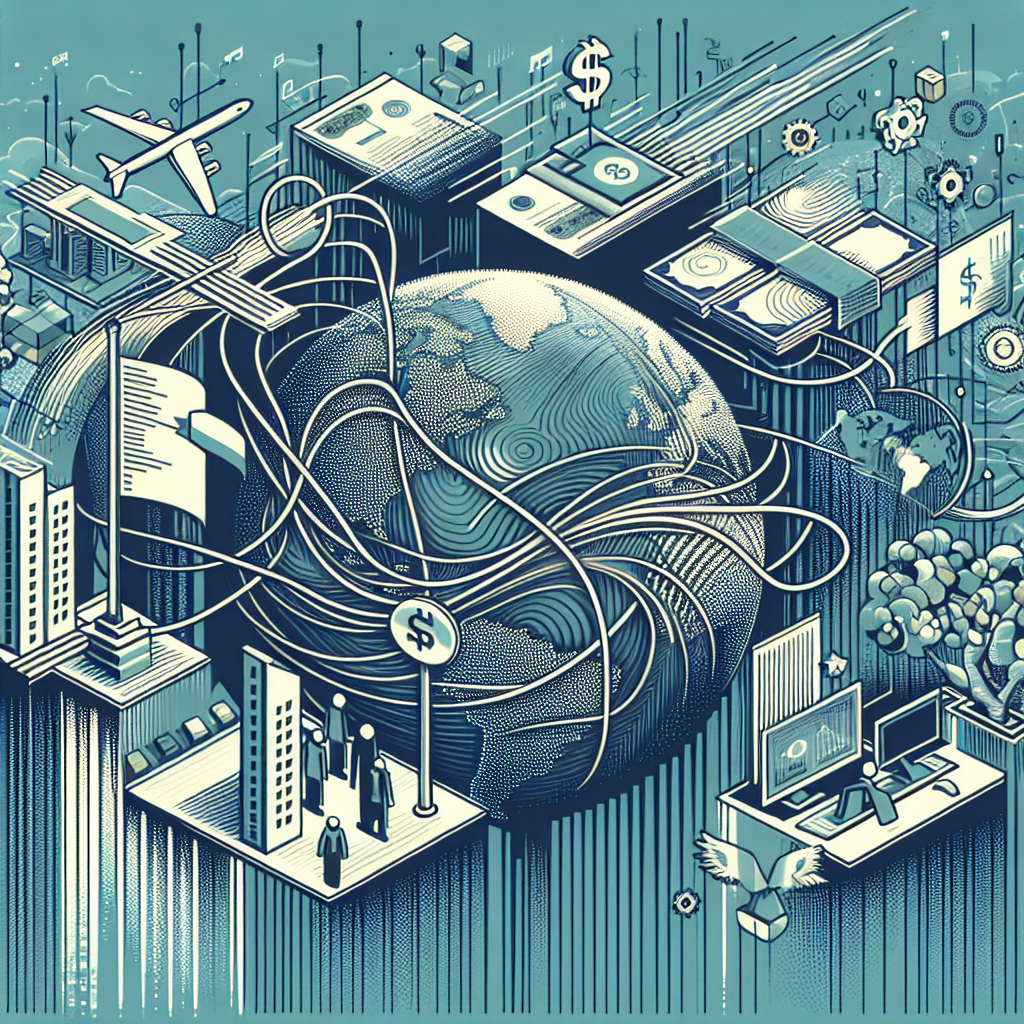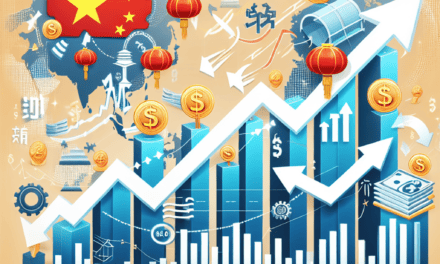“Citigroup Warns: Trump’s Policies May Stall Emerging Market Progress”
Introduction
Citigroup has issued a warning that the economic policies implemented by former President Donald Trump could pose significant challenges to the growth of emerging markets. The financial institution highlights concerns over protectionist trade measures, potential disruptions in global supply chains, and shifts in international economic alliances that may arise from Trump’s policy framework. These factors, Citigroup suggests, could lead to increased volatility and uncertainty in emerging economies, potentially stalling their development and impacting global economic stability. The cautionary stance underscores the interconnected nature of global markets and the far-reaching implications of U.S. economic policies on developing regions.
Impact Of Trump’s Trade Policies On Emerging Markets
Citigroup has recently issued a cautionary note regarding the potential impact of former President Donald Trump’s trade policies on emerging markets. As the global economic landscape continues to evolve, the policies implemented during Trump’s administration remain a point of concern for financial analysts and investors alike. Emerging markets, which are often seen as engines of global growth due to their rapid industrialization and expanding consumer bases, could face significant challenges if these policies are reinstated or intensified.
To understand the potential implications, it is essential to consider the nature of Trump’s trade policies. His administration was characterized by a protectionist stance, with a focus on reducing trade deficits and promoting domestic manufacturing. This approach led to the imposition of tariffs on a wide range of imported goods, particularly from China, which in turn sparked retaliatory measures. The resulting trade tensions created an environment of uncertainty that affected global supply chains and market stability.
Emerging markets, which are heavily reliant on exports and foreign investment, are particularly vulnerable to such disruptions. Tariffs and trade barriers can lead to increased costs for exporters, making their goods less competitive on the global stage. This, in turn, can result in reduced demand for their products, ultimately impacting economic growth. Furthermore, the uncertainty surrounding trade policies can deter foreign investment, as investors may be hesitant to commit capital in an unpredictable environment.
Citigroup’s analysis highlights that the potential reimplementation of these policies could exacerbate existing vulnerabilities in emerging markets. Many of these economies are already grappling with challenges such as high debt levels, inflationary pressures, and political instability. The added strain of trade barriers could further hinder their growth prospects, making it difficult for them to recover from the economic setbacks caused by the COVID-19 pandemic.
Moreover, the interconnectedness of the global economy means that the repercussions of trade policies are not confined to the countries directly involved. Supply chain disruptions can have a ripple effect, impacting industries and consumers worldwide. For instance, a slowdown in manufacturing in one emerging market can lead to shortages of goods and components in other regions, affecting production and prices globally.
In light of these potential challenges, Citigroup emphasizes the importance of multilateral cooperation and dialogue to address trade issues. By fostering an environment of collaboration, countries can work towards solutions that promote fair and open trade, benefiting all parties involved. This approach could help mitigate the negative impacts of protectionist policies and support the continued growth of emerging markets.
In conclusion, while the legacy of Trump’s trade policies continues to loom over the global economy, it is crucial for policymakers and investors to remain vigilant and proactive. By understanding the potential risks and working towards collaborative solutions, the international community can help ensure that emerging markets remain resilient and continue to contribute to global economic growth. As the world navigates an increasingly complex economic landscape, the importance of open dialogue and cooperation cannot be overstated.
Citigroup’s Analysis Of U.S. Economic Policies
Citigroup has recently issued a cautionary analysis regarding the potential impact of former President Donald Trump’s economic policies on emerging market growth. As the global economy continues to navigate the complexities of post-pandemic recovery, the policies implemented by major economies like the United States hold significant sway over international markets. Citigroup’s analysis delves into the intricacies of these policies, highlighting the potential challenges and implications for emerging markets.
To begin with, Citigroup points out that Trump’s economic policies, characterized by protectionism and a focus on domestic growth, could inadvertently stifle the growth prospects of emerging markets. The emphasis on “America First” policies, including tariffs and trade barriers, has the potential to disrupt global supply chains. This disruption could lead to increased costs for emerging market economies that rely heavily on exports to the United States. As a result, these countries may face challenges in maintaining their growth trajectories, which have been largely driven by trade and investment flows.
Moreover, Citigroup’s analysis underscores the potential impact of U.S. tax policies on emerging markets. The tax cuts implemented during Trump’s administration, aimed at stimulating domestic investment, could lead to capital outflows from emerging markets. Investors seeking higher returns may redirect their capital towards the United States, thereby reducing the availability of foreign investment in emerging economies. This shift in capital flows could exacerbate existing vulnerabilities in these markets, particularly those with high levels of external debt.
In addition to trade and tax policies, Citigroup also highlights the implications of U.S. monetary policy under Trump’s influence. The Federal Reserve’s approach to interest rates and monetary tightening could have far-reaching effects on emerging markets. Higher interest rates in the United States could lead to a stronger dollar, making it more expensive for emerging market countries to service their dollar-denominated debt. This scenario could increase the financial burden on these economies, potentially leading to currency depreciation and inflationary pressures.
Furthermore, Citigroup’s analysis considers the geopolitical ramifications of Trump’s policies. The administration’s stance on international relations, including tensions with China and other key trading partners, could create an environment of uncertainty and volatility in global markets. Emerging economies, which often rely on stable international relations for trade and investment, may find themselves caught in the crossfire of geopolitical tensions. This uncertainty could deter investment and hinder economic growth in these regions.
Despite these challenges, Citigroup acknowledges that emerging markets possess certain strengths that could help mitigate the impact of Trump’s policies. Many of these economies have diversified their trade partnerships and strengthened regional cooperation, which could provide a buffer against external shocks. Additionally, structural reforms and investments in infrastructure and technology could enhance their resilience and competitiveness in the global market.
In conclusion, Citigroup’s analysis presents a nuanced view of the potential impact of Trump’s economic policies on emerging market growth. While the challenges are significant, the resilience and adaptability of these economies should not be underestimated. As the global economic landscape continues to evolve, emerging markets will need to navigate these challenges strategically, leveraging their strengths and seeking opportunities for growth amidst uncertainty. The interplay between U.S. policies and emerging market dynamics will undoubtedly shape the future trajectory of the global economy, making it imperative for policymakers and investors to remain vigilant and proactive in addressing these complex issues.
Emerging Market Growth Challenges Under Trump’s Administration
Citigroup has recently issued a cautionary note regarding the potential impact of former President Donald Trump’s policies on the growth of emerging markets. As the global economic landscape continues to evolve, the policies enacted during Trump’s administration could have lingering effects on these markets, which are often seen as engines of global growth due to their rapid development and increasing integration into the world economy. Understanding the implications of these policies is crucial for investors, policymakers, and stakeholders who are navigating the complexities of international finance.
One of the primary concerns highlighted by Citigroup is the protectionist trade policies that were a hallmark of Trump’s tenure. The imposition of tariffs on a wide range of goods, particularly those from China, set off a series of retaliatory measures that disrupted global supply chains. Emerging markets, many of which are heavily reliant on exports, found themselves caught in the crossfire of these trade tensions. The uncertainty surrounding trade agreements and the potential for further tariffs created an unpredictable environment that could deter investment and slow economic growth in these regions.
Moreover, the Trump administration’s approach to international relations, characterized by a preference for bilateral agreements over multilateral cooperation, may have further complicated matters for emerging markets. This shift in diplomatic strategy often left smaller economies with less negotiating power, potentially leading to less favorable trade terms. As a result, emerging markets could face challenges in accessing the benefits of global trade, which are essential for their continued development and integration into the global economy.
In addition to trade policies, Citigroup also points to the impact of Trump’s tax reforms, which included significant corporate tax cuts. While these reforms were designed to stimulate domestic investment in the United States, they also had the unintended consequence of attracting capital away from emerging markets. The repatriation of funds by U.S. companies, incentivized by lower tax rates, may have led to reduced foreign direct investment in emerging economies. This shift in capital flows could hinder the ability of these markets to finance infrastructure projects and other initiatives critical to their growth.
Furthermore, the strong dollar policy pursued during Trump’s administration added another layer of complexity for emerging markets. A stronger U.S. dollar can lead to increased borrowing costs for countries with dollar-denominated debt, a common scenario in many emerging economies. As these countries face higher debt servicing costs, their fiscal stability could be threatened, potentially leading to economic slowdowns or even crises.
Despite these challenges, it is important to note that emerging markets are not without resilience. Many have taken steps to diversify their economies, strengthen their financial systems, and build reserves to buffer against external shocks. However, the legacy of Trump’s policies may still pose significant hurdles that require careful navigation.
In conclusion, Citigroup’s cautionary stance underscores the need for emerging markets to remain vigilant and adaptable in the face of potential headwinds stemming from past U.S. policies. As the global economic environment continues to shift, these markets must find ways to mitigate risks and capitalize on opportunities to sustain their growth trajectories. Investors and policymakers alike should closely monitor these developments to ensure that emerging markets can continue to play a vital role in the global economy.
Citigroup’s Concerns Over U.S. Tariffs And Emerging Economies

Citigroup has recently expressed concerns that the economic policies implemented by former President Donald Trump could pose significant challenges to the growth of emerging markets. As the global economy continues to navigate the complexities of international trade, Citigroup’s analysis highlights the potential ramifications of U.S. tariffs and protectionist measures on developing economies. These concerns are particularly relevant as emerging markets have become increasingly integrated into the global supply chain, making them more susceptible to shifts in U.S. trade policy.
To begin with, the imposition of tariffs by the Trump administration was primarily aimed at reducing the U.S. trade deficit and protecting domestic industries. However, these measures have had far-reaching consequences beyond American borders. Emerging markets, which often rely heavily on exports to the United States, have found themselves caught in the crossfire of trade tensions. For instance, countries like China, Mexico, and Brazil have experienced disruptions in their export sectors, leading to economic uncertainty and volatility. As a result, Citigroup warns that prolonged trade disputes could undermine the growth prospects of these economies, potentially stalling their development.
Moreover, the ripple effects of U.S. tariffs extend beyond direct trade relationships. Emerging markets are also affected by the broader impact on global supply chains. As tariffs increase the cost of goods, multinational companies may reconsider their production and sourcing strategies, potentially relocating operations to mitigate the impact of higher tariffs. This shift could lead to reduced foreign direct investment in emerging markets, further hindering their economic growth. Citigroup emphasizes that such changes in investment patterns could have long-term implications for these economies, affecting job creation and technological advancement.
In addition to trade-related concerns, Citigroup also highlights the potential impact of U.S. monetary policy on emerging markets. The Trump administration’s fiscal policies, including tax cuts and increased government spending, have contributed to a stronger U.S. dollar. While a robust dollar can be beneficial for American consumers and businesses, it poses challenges for emerging markets with significant dollar-denominated debt. As the value of the dollar rises, the cost of servicing this debt increases, placing additional strain on these economies. Citigroup cautions that this could lead to financial instability in some emerging markets, particularly those with weaker economic fundamentals.
Furthermore, Citigroup underscores the importance of multilateral cooperation in addressing these challenges. The bank advocates for a more collaborative approach to international trade, emphasizing the need for dialogue and negotiation to resolve trade disputes. By fostering an environment of cooperation, Citigroup believes that the global economy can better navigate the complexities of trade and investment, ultimately benefiting both developed and emerging markets.
In conclusion, Citigroup’s analysis serves as a reminder of the interconnectedness of the global economy and the potential consequences of protectionist policies. While the Trump administration’s tariffs were intended to bolster the U.S. economy, their impact on emerging markets cannot be overlooked. As these economies continue to play a vital role in global growth, it is crucial for policymakers to consider the broader implications of their actions. By promoting open dialogue and cooperation, the international community can work towards a more stable and prosperous economic future for all.
The Role Of U.S. Foreign Policy In Emerging Market Development
In recent years, the intricate relationship between U.S. foreign policy and the development of emerging markets has garnered significant attention from economists and policymakers alike. Citigroup, a leading global financial institution, has recently issued a cautionary note regarding the potential impact of former President Donald Trump’s policies on the growth trajectory of these markets. As emerging economies strive to integrate into the global economic framework, the influence of U.S. policy decisions becomes increasingly pivotal. Understanding this dynamic is crucial for stakeholders aiming to navigate the complexities of international trade and investment.
To begin with, it is essential to recognize that U.S. foreign policy plays a substantial role in shaping the economic landscape of emerging markets. The United States, as one of the world’s largest economies, exerts considerable influence through its trade agreements, diplomatic relations, and economic sanctions. During Trump’s administration, a shift towards protectionism and unilateralism marked a departure from the multilateral trade agreements that had previously characterized U.S. policy. This shift was epitomized by the imposition of tariffs on a range of goods, which not only affected bilateral trade relations but also had ripple effects across global supply chains.
Citigroup’s analysis highlights that such protectionist measures could pose significant challenges for emerging markets, which often rely heavily on exports to fuel their economic growth. By disrupting established trade patterns, these policies can lead to increased volatility and uncertainty, deterring investment and hindering economic development. Moreover, the imposition of tariffs can escalate trade tensions, prompting retaliatory measures that further exacerbate the situation. For emerging markets, which may lack the economic resilience of more developed nations, these disruptions can have profound implications.
Furthermore, Citigroup points out that the potential rollback of multilateral trade agreements under Trump’s policies could undermine the progress made by emerging markets in integrating into the global economy. These agreements have historically provided a framework for reducing trade barriers, fostering cooperation, and promoting economic growth. By moving away from such agreements, the U.S. risks isolating itself and its trading partners, thereby stalling the momentum of globalization that has been a driving force behind the development of emerging markets.
In addition to trade policies, U.S. foreign policy under Trump also emphasized a more confrontational stance towards certain countries, notably China. This approach has led to heightened geopolitical tensions, which can create an environment of uncertainty that is detrimental to economic growth. Emerging markets, often caught in the crossfire of such geopolitical conflicts, may find themselves compelled to navigate a complex web of alliances and rivalries, which can divert resources away from development initiatives.
Nevertheless, it is important to acknowledge that the impact of U.S. foreign policy on emerging markets is not solely negative. In some cases, the reorientation of trade policies can open up new opportunities for these economies to diversify their trading partners and reduce dependency on traditional markets. However, the overall consensus among analysts, including those at Citigroup, is that the potential risks posed by Trump’s policies outweigh the benefits, particularly in the short to medium term.
In conclusion, the role of U.S. foreign policy in shaping the development of emerging markets is multifaceted and complex. While there are opportunities for growth and diversification, the challenges posed by protectionist measures and geopolitical tensions cannot be overlooked. As emerging markets continue to navigate this evolving landscape, it is imperative for policymakers and investors to remain vigilant and adaptable, ensuring that they are well-positioned to mitigate risks and capitalize on opportunities in an increasingly interconnected world.
Citigroup’s Perspective On Trump’s Economic Strategies
Citigroup, a leading global financial institution, has recently expressed concerns regarding the potential impact of former President Donald Trump’s economic policies on emerging market growth. As the world continues to grapple with the aftereffects of the COVID-19 pandemic and other geopolitical tensions, the economic strategies implemented by influential nations like the United States hold significant sway over global markets. Citigroup’s analysis suggests that certain aspects of Trump’s policies could pose challenges to the growth trajectories of emerging economies, which are crucial engines of global economic expansion.
One of the primary concerns highlighted by Citigroup is the protectionist trade policies that were a hallmark of Trump’s administration. These policies, characterized by increased tariffs and a focus on bilateral trade agreements, have the potential to disrupt the intricate web of global trade. Emerging markets, which often rely heavily on exports to drive their economic growth, could find themselves at a disadvantage if such protectionist measures are reinstated or intensified. The imposition of tariffs can lead to increased costs for goods, making exports from these markets less competitive on the global stage. Consequently, this could stifle economic growth in regions that are already vulnerable to external shocks.
Moreover, Citigroup points to the potential for heightened geopolitical tensions under Trump’s policies, which could further destabilize emerging markets. The former president’s approach to foreign relations often involved a more confrontational stance, particularly with major economies like China. Such tensions can lead to uncertainty in global markets, causing fluctuations in currency values and investment flows. Emerging markets, which are often more susceptible to volatility, could experience capital flight and reduced foreign direct investment as investors seek safer havens. This, in turn, could hinder their ability to finance development projects and sustain economic growth.
In addition to trade and geopolitical concerns, Citigroup also raises the issue of fiscal policies that could impact emerging markets. Trump’s administration was known for implementing significant tax cuts, which, while stimulating domestic growth, also contributed to an increase in the U.S. budget deficit. A growing deficit could lead to higher interest rates as the government seeks to attract investors to finance its debt. For emerging markets, this scenario could result in increased borrowing costs, making it more challenging to service existing debt and finance new initiatives. Higher interest rates in the U.S. can also lead to a stronger dollar, which can exacerbate debt burdens for countries with dollar-denominated liabilities.
Furthermore, Citigroup emphasizes the importance of multilateral cooperation in addressing global economic challenges. Trump’s policies often favored unilateral actions over collaborative efforts, which could undermine the effectiveness of international institutions designed to support emerging markets. In an interconnected world, the ability to work together on issues such as climate change, public health, and financial stability is crucial for sustainable growth. Emerging markets, which may lack the resources to tackle these challenges independently, could suffer if multilateral support is weakened.
In conclusion, while Trump’s economic strategies may have been designed to prioritize American interests, Citigroup cautions that their broader implications could hinder the growth of emerging markets. As these economies play a vital role in driving global prosperity, it is essential to consider the potential consequences of such policies on their development. By fostering an environment of cooperation and open trade, the international community can help ensure that emerging markets continue to thrive and contribute to a more balanced and resilient global economy.
Potential Risks For Emerging Markets From U.S. Policy Changes
Citigroup has recently issued a cautionary note regarding the potential impact of former President Donald Trump’s policies on emerging market growth. As the global economic landscape continues to evolve, the policies enacted by major economies like the United States can have far-reaching implications for developing nations. Emerging markets, which are often characterized by rapid economic growth and increased integration into the global economy, are particularly susceptible to shifts in U.S. policy. Citigroup’s analysis highlights several key areas where Trump’s policies could pose risks to these markets.
To begin with, trade policies under Trump’s administration have been a significant point of concern. The imposition of tariffs and the renegotiation of trade agreements were central to Trump’s economic strategy. Such measures can disrupt global supply chains and create uncertainty in international trade, which is vital for emerging markets that rely heavily on exports. For instance, countries in Asia and Latin America that are integrated into manufacturing supply chains could face challenges if trade barriers are erected. This could lead to reduced export revenues and slower economic growth, as these nations may struggle to find alternative markets or adjust to new trade dynamics.
Moreover, Trump’s stance on immigration and foreign investment could also have implications for emerging markets. Restrictive immigration policies may limit the flow of skilled labor, which is crucial for the development of industries in these countries. Additionally, changes in foreign investment policies could deter U.S. companies from investing in emerging markets, thereby reducing the capital inflows that are essential for infrastructure development and economic expansion. This could hinder the ability of these nations to modernize their economies and improve living standards for their populations.
Furthermore, Citigroup points out that Trump’s fiscal policies, particularly tax cuts and increased government spending, could lead to higher interest rates in the United States. This, in turn, may result in capital outflows from emerging markets as investors seek higher returns in the U.S. financial markets. Such capital flight can lead to currency depreciation and increased borrowing costs for emerging economies, exacerbating their financial vulnerabilities. Countries with high levels of foreign-denominated debt could find it particularly challenging to service their obligations, potentially leading to financial instability.
In addition to these economic factors, geopolitical considerations also play a role. Trump’s foreign policy approach, characterized by a focus on bilateral relations and a departure from multilateral agreements, could alter the geopolitical landscape in ways that affect emerging markets. For example, shifts in U.S. alliances and partnerships may influence regional stability and security, impacting economic prospects in these regions. Emerging markets that are heavily reliant on U.S. security guarantees or economic partnerships may need to reassess their strategic positions and explore new alliances.
In conclusion, while emerging markets have shown resilience and adaptability in the face of global economic changes, the potential risks posed by Trump’s policies cannot be overlooked. Citigroup’s cautionary note serves as a reminder of the interconnectedness of the global economy and the importance of considering the broader implications of policy decisions made by major economies. As emerging markets navigate these challenges, they may need to adopt strategies that enhance their economic resilience and diversify their trade and investment relationships. By doing so, they can better position themselves to withstand potential disruptions and continue on their path of growth and development.
Q&A
1. **What is Citigroup’s main concern regarding Trump’s policies?**
Citigroup is concerned that Trump’s protectionist trade policies could hinder growth in emerging markets.
2. **Which specific policies are seen as potentially harmful to emerging markets?**
Policies such as increased tariffs, renegotiation of trade agreements, and stricter immigration controls are seen as potentially harmful.
3. **How might these policies impact emerging market economies?**
These policies could lead to reduced exports, lower foreign investment, and economic instability in emerging markets.
4. **What sectors in emerging markets are most at risk?**
Sectors heavily reliant on exports, such as manufacturing and agriculture, are most at risk.
5. **Has Citigroup suggested any strategies for emerging markets to mitigate these risks?**
Citigroup suggests that emerging markets diversify their trade partners and strengthen domestic markets to mitigate risks.
6. **What is the potential impact on global economic growth?**
A slowdown in emerging market growth could lead to a broader slowdown in global economic growth.
7. **Are there any potential benefits for emerging markets from Trump’s policies?**
Some emerging markets might benefit from shifts in trade dynamics, such as increased trade with other regions or countries.
Conclusion
Citigroup has expressed concerns that the policies implemented by former President Donald Trump could potentially impede the growth of emerging markets. The bank highlights that protectionist trade measures, such as tariffs and renegotiation of trade agreements, could disrupt global supply chains and reduce market access for emerging economies. Additionally, tighter immigration policies and changes in foreign policy could lead to reduced foreign investment and economic uncertainty in these regions. Citigroup warns that these factors, combined with potential shifts in U.S. monetary policy, could create a challenging environment for emerging markets, potentially slowing their economic growth and development.





